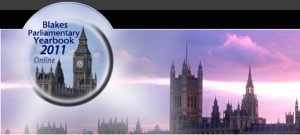
The Parliamentary Information Office of the Parliamentary Yearbook is currently gathering news items for major features on the security threats posed to our maritime heritage
Ours is an island nation wholly dependent upon our maritime industry and some 90+% of the world's goods are carried by sea safely and in an environmentally friendly way. Yet it only hits the headlines when there is some form of tragedy ... oil spill, wreck or piracy. We intend to do our best to remedy this lack of good news and shall be including a series of reports on the importance of our marine industry within the next edition of the Parliamentary Yearbook.
One of the major aspects is of course security ... not simply piracy but vessel recovery, port and vessel security, risk assessment, crew training etc. Within the reports there will also be pieces from other organisations involved in maritime affairs including broking and chartering; marine resource management; marine biology; offshore renewables etc.
In February David Cameron urged delegates at the London Conference on Somalia to “keep up the pressure on pirates”. The Conference reiterated our determination to eradicate piracy, noting that the problem requires a comprehensive approach on land as well as at sea. Concern was expressed that hostages in Somalia are being held longer and with more use of violence and welcomed the work of the Contact Group on Piracy off the Coast of Somalia. Delegates also welcomed the success of international military efforts and remained committed to such efforts with robust rules of engagement and sufficient force generation. They called for full implementation of the Djibouti Code of Conduct and the adoption of an Exclusive Economic Zone. We shall be reviewing progress including the Piracy Conference in the UAE in June.
Naval forces and the shipping industry succeeded in halving the number of successful hijackings (to 25 in 2011 from 47 in 2010) despite an increase in hijack attempts (to 151 in 2011 from 127 in 2010). But both need resources, commitment and perseverance to defeat and eradicate Somali piracy as opposed to simply deterring and repressing it.
At the end of 2011 The Parliamentary Under Secretary of State for Transport, Mike Penning MP, said in written statement to the House:
“The rise in the number of incidents involving pirates in certain parts of the world has highlighted the need to ensure UK-flagged vessels are able to adequately protect themselves against such threats. Evidence shows that ships with armed guards are less likely to be attacked and taken for ransom and the House will be aware that the Prime Minister confirmed last month that the Government now recognises the use of private armed guards as an option to protect UK registered ships and their crews from acts of piracy.
“I am therefore today, publishing interim guidance to shipping companies on the use of armed guards onboard UK flagged ships. This guidance covers, amongst other things, the factors to be included in the risk assessment, advice on selecting a private security company, and a requirement for the shipping company to produce a counter-piracy plan and submit a copy to my Department.
“A private security company (PSC) employed to put armed guards onboard UK ships will require authorisation from the Home Office for possession of any prohibited firearms as defined in the Firearms Act 1968 (as amended). Checks will be carried out by the Home Office and Police into the PSC and its personnel before an authorisation is granted.”
The guidance to shipping companies, and the Home Office process for authorising the possession of prohibited firearms, are both interim and will be reviewed within 12 months so that they reflect continuing national and international work to ensure high standards in the provision of armed guards in the maritime domain.
Over the course of the next twelve months, and with the assistance of companies involved in maritime security, the Parliamentary Information Office of the Parliamentary Yearbook will report on the success of the measures as this becomes evident.
This was submitted by the Parliamentary Information Office. For more information visit Parliamentary Information Office.
